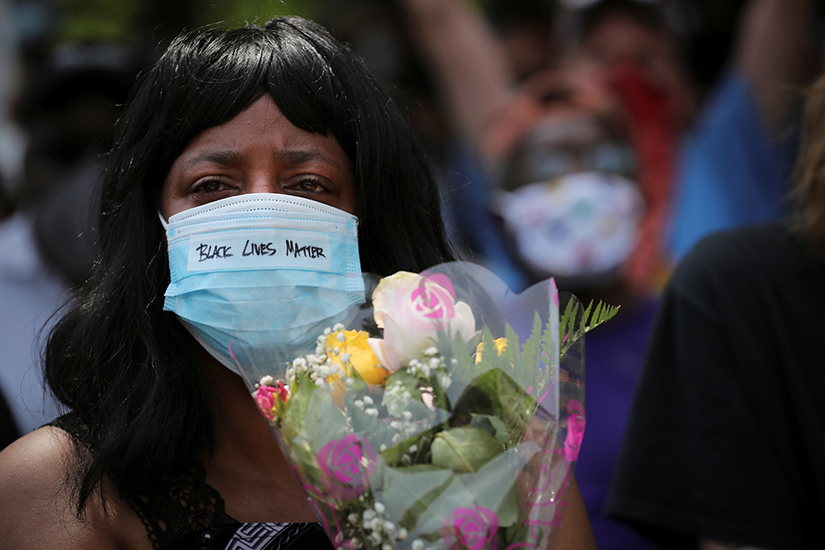ST. PAUL, Minn. — Amid the turmoil following George Floyd’s death in Minneapolis, Archbishop Bernard A. Hebda said the Catholic Church must proclaim the Gospel message of Jesus’ love for all people, as well as its teaching on the dignity of human life.
The Church also can provide a way for people to process what they are experiencing, in the Twin Cities and beyond, after Floyd’s death, including anger or fear, the archbishop said.
The events since Floyd’s death May 25 while he was pinned to the ground by a Minneapolis police officer have revealed countrywide concern and anger about racism “that was just below the surface,” he said.
“Until we address the underlying wound, it’s not going to go away,” Archbishop Hebda told The Catholic Spirit, newspaper of the Archdiocese of St. Paul and Minneapolis, June 1. “And so it (racism) is something we have to really address head-on, but in a way that brings to bear the light of Christ, which is hopeful even in addressing painful situations.”
 A woman in New York City is seen at a public memorial for George Floyd June 4. Archbishop Bernard Hebda of Minneapolis-St. Paul said the Catholic Church can help provide a way for people to process what they are experiencing, in the Twin Cities and beyond.Photo Credits: Jeenah Moon | ReutersWatching Floyd’s death while he was handcuffed and face down on the ground begging to breathe was “shocking that there could be in anybody’s heart such an absence of concern for human life,” Archbishop Hebda said.
A woman in New York City is seen at a public memorial for George Floyd June 4. Archbishop Bernard Hebda of Minneapolis-St. Paul said the Catholic Church can help provide a way for people to process what they are experiencing, in the Twin Cities and beyond.Photo Credits: Jeenah Moon | ReutersWatching Floyd’s death while he was handcuffed and face down on the ground begging to breathe was “shocking that there could be in anybody’s heart such an absence of concern for human life,” Archbishop Hebda said.
As the archbishop has reflected on the incident, the more discouraging it has become, he said. But, he added, it also highlights the need for the Church to share the Gospel.
However, even when people experience righteous anger and long for justice, they are still called to love their brothers and sisters, Archbishop Hebda said.
“I think for so many people, that anger has clouded that. And so when we see the destruction in our cities, that’s a clarion call for us to make Jesus’ Good News present in a way that’s compelling and then brings people to a new perspective,” he said.
While rioting overwhelmed parts of Minneapolis the day after Floyd’s death, peaceful protests also have taken place throughout the days and nights since then. A memorial service for Floyd was held in Minneapolis June 4, and his body was returned to Houston, where he was raised, for additional memorial services and a funeral.
The four officers involved were fired from the Minneapolis Police Department and have since been charged in Floyd’s death. Derek Chauvin, the officer who pinned Floyd with his knee, has been charged with second-degree murder and second-degree manslaughter. The three others face charges of aiding and abetting second-degree murder, and aiding and abetting second-degree manslaughter.
Archbishop Hebda lives at a rectory in St. Paul, and said he has witnessed acts of kindness toward his neighbors including cleaning up and setting out food for those who need it.
“The generosity is phenomenal. It brings that ray of Christian hope into a bleak situation,” he said.
The local Church will renew its effort to address racism in society and the Catholic Church, Archbishop Hebda said. He pointed to two documents to guide those conversations: the U.S. Conference of Catholic Bishops’ 2018 document on racism and a 2003 pastoral letter written by Archbishop Harry J. Flynn of St. Paul and Minneapolis.
Efforts have also been underway in recent years to revive a black leadership initiative. “That is an area of interest, and we have been encouraging those discussions to take place in the black Catholic community,” he said. “In my mind, it’s important for us to move forward.”
For now, the archbishop suggested Catholics begin with prayer as well as an examination of conscience, looking at “how our lives have been shaped by racist attitudes, if they’ve been shaped by racist attitudes, regardless of the color of our skin.”
Racism “is certainly pervasive in society,” he said, “and even though I would love to say it has no place in the Church, we know that we bring our humanity to the pew. And that’s where the Lord has that chance to transform us.